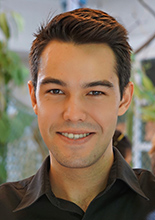DA alumnus Noah Gibbs on his career since graduating from the MAIS 22 in 2019
 DA: Following your studies at the DA, you became a Presidential Management Fellow at the Federal Emergency Management Agency (FEMA). What exactly are your responsibilities on the job and how did your career path look like so far?
DA: Following your studies at the DA, you became a Presidential Management Fellow at the Federal Emergency Management Agency (FEMA). What exactly are your responsibilities on the job and how did your career path look like so far?
Noah Gibbs: The Presidential Management Fellows (PMF) Program is the U.S. federal government's premier leadership development program for entry level professionals with graduate degrees. Fellows work for a U.S. government agency for two years, where they also receive 160 hours of leadership training. At the end of the two years, fellows have the option of becoming full-time employees at their respective agencies.
I am serving my fellowship at the Federal Emergency Management Agency (FEMA), where I am the Communications Lead for the National Exercise Division (NED). The exercises that NED plans and conducts simulate disasters such as earthquakes, hurricanes, and even terrorist attacks. Exercises help save lives by enabling emergency managers to test their plans before an actual disaster strikes. I support these exercises by ensuring NED communicates with its partners in a clear and coordinated manner. This includes managing talking points, editing email newsletters, preparing presentations for conferences, and leading various communications focused working groups.
Fellows also have the opportunity to spend six months on a developmental rotation working for an office outside of their home agency. I recently learned that I’ll be completing my rotation at the Department of Homeland Security’s (DHS) Office for International Affairs, which I am very excited about!
Have you always been interested in this specific career, or has this interest developed over time?
I've always wanted a career where I get to help save lives and travel internationally. I never envisioned myself working for FEMA specifically, but FEMA's mission of helping people before, during and after disasters aligned well with my desire to save lives. While FEMA is focused on responding to disasters only in the United States, the skills that I am developing at FEMA are applicable to fields like international humanitarian affairs.
How has the DA helped you develop your career?
The Diplomatic Academy’s location in Vienna makes it the ideal place to learn about multilateral diplomacy. Studying at the DA helped me get a political affairs internship with the United Nations Office for Disarmament Affairs. The experience I gained at the UN is what helped me land my rotation at DHS working on international affairs.
Is there a specific skill set taught at the DA that is particularly useful for your current job?
One of the DA’s enduring strengths is the diversity of the student body. DA students come from all over the world and bring a multitude of unique perspectives and experiences. Knowing how to communicate well with people who come from very different cultural backgrounds has proved to be an asset to my job as the FEMA National Exercise Division’s Communications Lead.
Where do you think the future will take you?
I still dream of becoming a diplomat one day, it’s why attended the DA in the first place. My plan is to use the experience I’m getting as a Presidential Management Fellow to join the U.S. Foreign Service or the United Nations. That said, the pandemic taught me how the path to our goals can twist and turn in ways we never expected. Whatever comes next, I’m going to focus on doing what I can, wherever I may be, to save lives and make the world just a little bit better.
[April 2022]